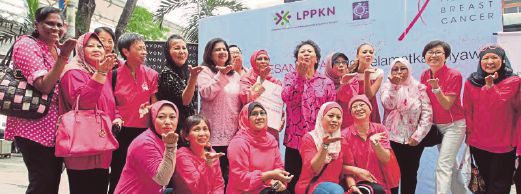When it comes to genetics screening for cancer, counselling before and after screening is important, writes Meera Murugesan
WHEN it comes to the “Big C”, we hope and pray we never have to face it. But the reality is that some of us will, while others have to live with the fact that they carry a risk of developing this dreaded disease.
WHERE IT STARTS
In general, all cancers are genetic but what needs to be made clear is that one can either acquire this genetic defect or mutations, or inherit it, says Assistant Professor Dr Abhimanyu Veerakumarasivam, the recipient of the 2012-2013 Merdeka Award Grant for International Attachment.
The geneticist, who is currently attached to Perdana University’s Graduate School of Medicine, explains that in general, five per cent of cancers are inherited predisposition, especially for breast, ovarian and colorectal cancer.
Around 90-95 per cent of breast, ovarian and colorectal cancer cases are caused by environmental factors. However, when a cancer (excluding leukaemia) is acquired early, such as before 40, doctors usually suspect that to be an inherited condition.
“The basis of cancer is genetics, acquiring a plethora of genetic mutations. Some people have an increased risk because they are born with an inherited mutation that predisposes them to acquiring more and more mutations.”
RADICAL OPTIONS
Inherited cancers are not necessarily more aggressive than acquired ones. However, the difference between the two is that a person with an inherited cancer has a higher chance of suffering a recurrence.
This is one reason why some women who test positive for the breast cancer BRCA1 or BRCA2 mutations choose to have a radical double mastectomy even before they actually get the disease.
It was a step famously taken by actress Angelina Jolie early last year and has since spurred many women in similar situations to make the same move.
The “Angelina Jolie effect,” as it’s now known, has also encouraged more women to get tested but Abhimanyu says it’s important that anyone who undergoes genetic testing for cancer be given both pre- and post-test counselling.
“This is crucial so they clearly understand what are their risks and management choices.”
He points out that Jolie would have got all the counselling and information she needed and was empowered and well-informed when making her decision.
That should be the case for every woman faced with the same situation. Whether or not she chooses to have a preventive double mastectomy after testing positive for the BRCA gene remains a personal decision.
UNDERSTANDING THE RISK
Abhimanyu says it’s also important to keep in mind that different gene mutations convey a different risk level.
“Jolie’s mutations indicated a risk of about 87 per cent but other people may have different mutations and risk levels.”
Some women may feel any risk is too much and opt to have their breasts removed, while others may refuse to do so even with a high chance of developing the disease.
“I asked this question as a classroom exercise with my students in medical school and even among them, the results were very varied.”
Abhimanyu who did his international attachment at the Institute of Genetic Medicine, Johns Hopkins School of Medicine in Baltimore, Maryland, says the benefit of genetic testing is the person who tests positive becomes more vigilant about his or her health.
They are more likely to go for regular health screening and if they do get cancer, it will be detected at an early stage.
The drawback of testing positive is that the person may feel like a ticking time bomb. For some, this can cause a lot of anxiety.
Others prefer not to know and to live in denial. Choosing to be tested, therefore, is also a personal decision.
But given the impact such a test can have on a person’s life, Abhimanyu stresses
again on the need for pre-and post-test counselling.
“What I don’t agree with is an over-the-counter approach to genetic testing. It’s crucial that we help people understand and interpret this genetic piece of information,” says Abhimanyu, who completed his PhD at the University of Cambridge.
CHANGING FACE OF CANCER
Genetic testing can also be used to determine the specific type of cancer a person is suffering from because the disease today is evolving.
Cancers with different types of mutations are emerging and drugs are being designed for these specific types of cancers. For example, in the case of breast cancer, it can be divided into 10 different subtypes.
Genetic testing plays a role here to determine the type of drug most suitable for a particular type of breast cancer. This test acts more as a diagnostic tool rather than a predictive one like the previous test.
In Malaysia unfortunately, many cancer patients are still being diagnosed at a late stage. Abhimanyu says the mortality and morbidity associated with cancers in Malaysia can be significantly reduced through better awareness and with patients going to clinics much earlier.
“That should be the No.1 step in this issue, even before the next big drug or next big genetic test. If people just go and get diagnosed earlier, things may be completely different.”
(Source: NST, 2 December 2014)

No comments:
Post a Comment